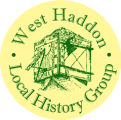Village businesses within living memory
Among the businesses which are never mentioned in the Trade Directories is the Symington corset factory, but those whose memories stretch back further still remember it clearly. It was very small, hardly more than a shed, and it stood some way back from the street in Station Road, near Staffords Lane. There were about six sewing machines in it and Doris Webb remembered that both her mother and grandmother worked there. A girl would train at the factory, paying towards a machine of her own at the rate of one shilling per week. Work was paid for by the piece; second quality work fetched one shilling and eleven pence per dozen (about 10p) while the best fetched two shillings and eleven pence per dozen (about 15p). Once a girl had her own machine she was able to work from home. The work stopped once Symington’s Rugby factory was built. (The main factory was in Market Harborough).
While the village considered itself lucky in the 1980s and 1990s to support two general food stores, villagers earlier in the century had an infinitely wider choice of butchers, bakers, grocers and sweet shops.
Emily Gammage remembered gouing to Miss Jelly’s sweet shop in West End to buy ‘everlasting sticks’.
There were a number of butchers in the village. Cross’s shop was in High Street (by the corner of Crown Lane) where there was once a bus stop. They killed their own beasts round the back in Chequers Lane (Crown lane) and small boys of the village took great delight in watching the proceedings, and perhaps running home to scare mother with a bloodied face and hands. The down side to this arrangement was the large number of rats which the slaughter house attracted. There were a number of cottages in the garden of Tower House, which were only demolished after the Second World War when council housing was built in Elizabeth Road. The old cottages were thatched and the rats were a big problem.
Denys Bush used to recall how his father, the baker, roasted people’s Sunday lunches on the one day in the week when his huge bakehouse ovens were not being used to bake bread. Theis bakehouse was where Hopwell’s antiques is today. Other villagers remember taking their joint to the bakehouse at the top of Station Road (adjacent to Crystal House) on their way top church.
Next door to Bush’s in the High Street, at the house now known as Clover Cottage, Fred Hutchins looked after the bikes of the village. He repaired them, and even ran a bike hire service for those without bikes of their own.
